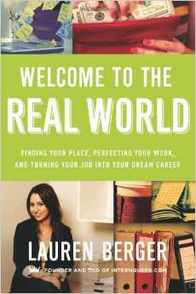 Does your daughter need help figuring out what to do with her English major? Is it time to make that high school resume look professional for internship applications? Concerned your son is going to graduate college with an impressive GPA but without the skills to market himself to employers? Real World Ready teaches college students the essential skills necessary to make the leap from college to career. In a series of one-on-one meetings and follow-up homework assignments, Laura will guide your child through the process of exploring his or her interests and goals, polishing written job search materials, and developing a detailed job search strategy. Your child will learn critical job search skills that will be both useful in the short-term and invaluable for the future. Real World Ready is divided into three phases: Assess, Advocate, and Accelerate. Each phase includes two Skype meetings (a total of six meetings) and all e-mail correspondence regarding assignments. For more details, visit www.vinikeps.com/realworldready
1 Comment
 A recent study suggests that employers do not think college students are graduating with the skills necessary to succeed in the business world. The findings focus on skills like critical thinking, analytical reasoning, and communication skills -- ones that many employers prioritize over actual subject matter knowledge, which can become quickly outdated. Will these findings motivate more colleges to create programs blending STEM and the humanities? Will we start to see more new programs in entrepreneurship and business skills that can supplement a liberal arts education? For more details on the recent study, check out the following articles:
 "They Loved Your G.P.A. Then They Saw Your Tweets." -- This New York Times article received a lot of attention when it was published during the 2013-2014 admissions cycle. While most schools do not routinely check applicants' social media sites, 31% of surveyed admissions officers admitted to visiting an applicant's Facebook page or other social media page to learn more about them. Whether you are applying to colleges or applying to jobs, the message is clear -- do not post incriminating pictures on Facebook, angry rants on Twitter, or anything else that can be found online and might raise questions about your judgment!  DO: 1. Relax! There is nothing wrong with taking a few days to relax before beginning your job search. You deserve to celebrate the accomplishment of graduating college and enjoy time with family and friends before jumping into the “real world.” Searching for a job is a marathon, not a sprint – starting a few days later won’t derail your career, and will enable you to start your job hunt relaxed and refreshed. 2. Update your LinkedIn profile. If you haven’t joined LinkedIn yet, create a profile on day one of your job hunt. A LinkedIn profile is essential for job seekers and will help you keep track of your contacts, research companies, and locate people for networking meetings. Review this checklist for help updating your profile, and take a look at this sample profile for a college student. 3. Check in with your school’s Career Services. Many undergraduate career services offices provide services for alumni. Register for any job posting boards and find out what other services are available to you and for how long. 4. Set SMART goals. “I’m going to get a job” is a lot more overwhelming than “I’m going to send out 5 resumes and cover letters by Friday, and research and join 2 relevant networking associations by the end of the month.” Break down larger goals into smaller concrete tasks that are Specific, Measurable, Achievable, Relevant, and Time-sensitive. If you need accountability and can’t hire a career coach, try a free website like Stickk.com where you can make a “commitment contract” with yourself. For more information and a worksheet for setting SMART goals, look at this resource from Wake Forest University. 5. Check out some of my favorite resources. This page includes a list of books, blogs, and job search engines that I think are most useful for new graduates looking for jobs. You can also join my private Real World Ready Facebook group to stay up-to-date on news and advice relevant to your job search. DON’T: 6. Post incriminating pictures from your graduation celebrations. Potential employers WILL Google you! Enough said. 7. Rely on online job listings. While of course you should apply to postings you see online, you should NOT rely on this as your sole method of searching for jobs. Depending on who you believe, most people agree that over 70% of jobs are never posted. That means that in addition to applying to job postings online, you should be actively networking to access that “hidden” market of jobs that are never posted. 8. Use a generic cover letter. Employers are not impressed by generic cover letters that talk about making an impact at “your organization” or resumes that arrive on their own. From an employer’s perspective, if you aren’t interested enough to take the time to customize your application – how interested could you really be in this job? Sending 10 targeted customized applications is a far better use of your time than sending 50 generic resumes. 9. Apply to every position from accountant to zookeeper. Many job seekers think they are better off if they are willing to do any job – after all, that multiplies your options, right? But narrowing down your options and working to improve your credentials for those targeted fields is likely to yield better results. Consider this – a graduate’s dad has a business contact who works at a large corporation. Which person is easier to help? “My son just graduated and is looking for a job” – or – “My son majored in Psychology and interned at a communications firm. He’s looking for an entry-level marketing or public relations position.” 10. Give up hope. Will you find a job next week? Doubtful. Will your first job be your dream job? Also doubtful. But this doesn’t mean you should give up and take a minimum wage job and resign yourself to living in your parents’ basement until you are 30! Hiring doesn’t happen overnight, so be prepared for the process to stretch several weeks to several months, depending on what you are looking for. And think of your first job as getting your foot in the door of the professional working world and putting you on the path towards your dream job. Having realistic expectations from the start makes the process much more bearable!  There is no reason to have a LinkedIn page that is Joe.Smith/789w3763kuo6! Visit the LinkedIn Help Center for step-by-step instructions on changing your URL to something clean and simple. Of course chances are that by now, "Joe.Smith" is taken -- so if you have a common name you may need to get somewhat creative! Once you have a simple URL, consider including it in the signature block of your e-mail. If you are actively job searching, be sure to set your privacy settings broadly so that people who are not connected to you can view your profile. Go to your Privacy and Settings page (hover over your picture in the upper right corner), and under the "Helpful Links" subheading, select "Edit your public profile." On the right hand side, you will have the option to make your public profile visible to "no one" or "everyone." Once you choose "everyone," you can limit exactly what the public can and cannot see by checking various boxes. For more privacy tips, check out 5 LinkedIn Privacy Settings For Job Hunters by Kristin Burnham.  "What isn't anyone calling me? I'm sending out resumes and not getting any response!" Sound familiar? In the following article, Lea McLeod presents 5 Reasons Grads Are Failing in the Job Search. From not understanding the employer perspective to focusing too much on the short-term future, McLeod accurately assesses why many young adults are getting frustrated with the job search process. Read this article to shift your perspective and learn how to view the job search as a marketing campaign! Another great graduation gift! Starting today, you can buy Welcome to the Real World: Finding Your Place, Perfecting Your Work, and Turning Your Job into Your Dream Career, written by Lauren Berger (aka The “Intern Queen”). According to her website, Lauren Berger is arguably the nation's most in-demand career and internship expert. She is the CEO and founder of the top-internship website www.internqueen.com as well as www.laurenbergerinc.com. Her first book, All Work, No Pay, is a national campus bestseller. Berger has been featured on Today, Fox & Friends, Marie, the Hallmark Channel, and other media outlets. She has also appeared in the New York Times and Seventeen.
Anyone lucky enough to have choices for college has a list of things that are important to them: price, size, location, quality. But here’s an unconventional factor that students may want to start considering at a time when graduating from college with good grades may no longer be enough to get a job. It was written by Laura R. Hosid, who was the associate director of Georgetown University’s Office of Career Services and now works for Vinik Educational Placement Services, Inc. in Bethesda, which provides college and career counseling to young people.
Click here to read Laura's article featured on the Washington Post's Education blog! Know someone about to graduate? Here are some useful books that make great gifts:
Getting From College to Career by Lindsey Pollak Life After College by Jenny Blake You Majored in What?: Mapping Your Path from Chaos to Career by Katharine Brooks The Secret to Getting a Job after College by Dr. Larry Chiagouris They Don't Teach Corporate in College by Alexandra Levit Check out what these authors have to say!
Colleges Are Tested by Push to Prove Graduates' Career Success Schools Cite Hurdles in Measuring How Ex-Students Do in the Job Market (Wall Street Journal) In Defense Of The 'Impractical' English Major (Huffington Post) |
Categories
All
E-mail us at [email protected]
to learn more about our college, graduate school or career services. |
Vinik Educational Placement Services, Inc.

Vinik Educational Placement Services, Inc. * 4701 Sangamore Road, Suite S105 * Bethesda, MD 20816
301-320-9711 * [email protected]



 RSS Feed
RSS Feed